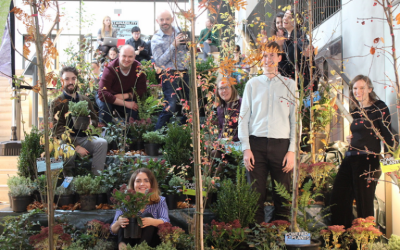Building a sustainable future
Philanthropic support brings zero-emission transport a step closer
Funding from Japanese manufacturer HORIBA has enabled UCL to recruit new academic posts focused on meeting the challenge of developing zero-emission transport.
The company will fund the HORIBA Chair in Advanced Propulsion Technologies as well as the work of two PhD students who will conduct research with them. The posts will sit within the UCL Advanced Propulsion Lab (APL), which will be based at UCL East.
Sustainable technologies such as electric and hydrogen fuel cell vehicles are crucial to the future wellbeing of society and the planet. This substantial support will play a key role in allowing UCL to shape the next generation of engineers at the forefront of decarbonising the transport sector. The contribution also supports UCL’s broader goal of helping to create a more sustainable world for everyone. By working with an industrial partner, UCL is able to bring together the people, facilities and resources needed to advance knowledge, then translate this new knowledge into real-world, life-saving applications.
Find out more
UCL launches the Centre for Climate Change and Sustainability Education
Based in the IOE, UCL’s Faculty of Education and Society, the new centre brings together experts from across UCL to transform the UK’s approach to teaching climate change and sustainability in schools, providing research-informed professional development for teachers and school leaders across all phases, subjects and career stages.
The importance of teacher development in the area of climate change and sustainability education is hard to overstate. This is the defining existential challenge of our time and the world that schoolchildren will encounter as adults will look different from our world today.
Find out more
- IOE, UCL's Faculty of Education and Society
- Centre for Climate Change and Sustainability Education
- Spotlight on Nicola Walshe
UCL ranked in top 10 in UK university 'green' league

Published by The Guardian, the People & Planet University League is a comprehensive and independent league table of 153 UK Higher Education institutions, ranked against a diverse set of environmental and ethical criteria.
UCL received an overall score of 71.8% ranked across 14 metrics of sustainability, up from 68.6% in 2022. This meant that UCL jumped 12 places in 2022 and ranked second highest among all Russell Group universities behind only the University of Exeter, which received a score of 72.2%.
UCL was awarded ‘First-Class’ Honours for the sixth consecutive time and received full marks in half of the 14 categories, namely: environmental policy; sustainable food; carbon management; auditing and environmental management systems; sustainability staff; staff and student engagement; and education for sustainable development.
Find out more
UCL at COP27
The Conference of the Parties to the United National Framework Convention on Climate Change – COP27 for short – is an annual session bringing together heads of state and delegates from around the world to negotiate a response to the global issue of climate change.
The 2022 summit took place in November 2022 in Sharm El-Sheikh, Egypt. UCL was represented by 21 delegates, with academics and researchers from a whole host of different departments and areas of expertise – including economics of innovation, climate change, social inequalities, child health, decarbonisation of shipping, racism and more – helping to shape the conversation and influence policy and decisions around climate change.
As well as UCL’s attendance at the summit, teams of academics also monitored and provided expert commentary from London, and UCL’s ongoing Generation One campaign continued, with a third season of our podcast exploring UCL’s work on climate change and reporting back from COP27.
Find out more
- UCL staff and students attending COP27 – profiles
- Comment and analysis from UCL’s climate experts
- Generation One
- UCL Climate Hub: A community for change
- Find out more about UCL’s work on the climate crisis with our podcasts and videos
- Summary of COP27
Images
- Sustainable UCL team, credit: Sustainable UCL
 Close
Close

